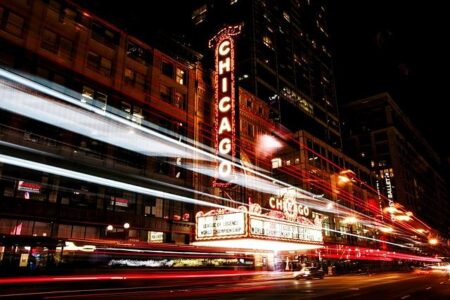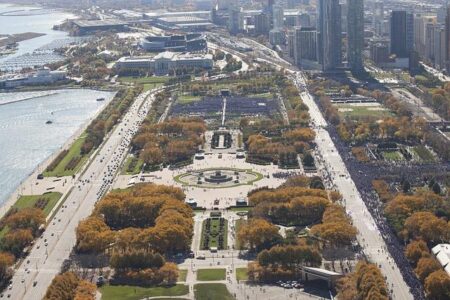Intensified Immigration Enforcement and Community Reactions in Chicago’s South Shore
ICE Executes Strategic Operation in South Shore Residential Complex
In a significant enforcement action early Tuesday, Immigration and Customs Enforcement (ICE) agents carried out a carefully coordinated raid targeting a densely populated apartment complex in Chicago’s South Shore area. The operation aimed at several units suspected of housing individuals with unresolved immigration statuses. Utilizing warrants authorized by the Department of Homeland Security, agents acted swiftly, detaining numerous residents as part of an ongoing investigation.
This enforcement move has ignited a wave of political and social discourse. Former President Donald Trump publicly suggested that Chicago could be repurposed as a military training ground to address the city’s escalating security challenges. His comments have stirred diverse reactions from political figures, community advocates, and law enforcement officials, highlighting the complex dynamics surrounding immigration enforcement in urban settings.
- Location: South Shore, a high-density residential neighborhood
- Timing: Conducted during early morning hours to reduce public disturbance
- Results: Multiple arrests and ongoing investigations
- Community Feedback: Varied responses from advocacy groups and police departments
| Detail | Information |
|---|---|
| Enforcement Team | ICE Special Enforcement Division |
| Objective | Immigration law enforcement |
| Units Targeted | Approximately 20 residential units |
| Official Response | Statement forthcoming from ICE |
Community Reactions and Emerging Concerns Post-Raid
Residents and local leaders in South Shore have expressed profound apprehension following the ICE operation, emphasizing the potential for increased community tension and erosion of trust. Many families voiced fears about the emotional and social impact of detentions, describing the raid as a targeted strike against immigrant populations. Demonstrations quickly formed outside the affected complex, with chants such as “No human being is illegal” and demands for sanctuary city protections underscoring calls for compassionate treatment and transparency.
Advocacy organizations have urged municipal authorities to reconsider their collaboration with federal immigration agencies, advocating for policies that balance public safety with the protection of civil rights.The inflammatory suggestion by former President Trump to militarize parts of Chicago has further heightened anxiety among residents and policymakers, who warn that such rhetoric risks deepening divisions and escalating fear.
| Issue | Effect on Community | Response Initiatives |
|---|---|---|
| Family Separations | Emotional trauma and instability | Legal aid and support networks |
| Distrust Toward Law Enforcement | Decreased cooperation with police | Calls for transparency and accountability |
| Risk of Militarization | Heightened fear and insecurity | Community dialogues and public forums |
Trump’s Proposal to Establish Military Training Zones in Chicago
Former President Donald Trump has sparked controversy by proposing that Chicago be designated as a site for military training exercises, citing the city’s rising security challenges. This proposal follows the recent ICE raid and aims to deter crime and violence by increasing military presence and preparedness in urban areas.
Trump argues that Chicago’s security issues resemble those in conflict zones where tactical military training is routine.He envisions multi-acre zones dedicated to live tactical drills,enhanced cooperation between military units and local law enforcement,and infrastructure improvements to support heightened security monitoring.
Reactions from city officials and community representatives have been mixed. Critics warn that introducing military operations into civilian neighborhoods could exacerbate mistrust and destabilize communities already grappling with social challenges. Conversely, proponents believe such measures could strengthen law enforcement capabilities and restore public order.
- Designated areas for live tactical military exercises
- Joint training programs between military personnel and police forces
- Upgrades to security infrastructure and surveillance systems
| Feature | Potential Advantages | Community Concerns |
|---|---|---|
| Military Training Facilities | Improved emergency response readiness | Disruption to daily life and privacy |
| Heightened Security Presence | Crime deterrence | Increased intimidation and fear |
| Collaborative Exercises | Enhanced law enforcement coordination | Blurring lines between civilian and military roles |
Expert Recommendations: Strengthening Interaction and Resident Protections
Policy analysts emphasize the critical need for improved communication between federal immigration authorities and local communities in the wake of the South Shore raid. They recommend establishing regular town hall meetings and appointing dedicated community liaisons to reduce misinformation and alleviate fears among residents.
Experts also advocate for bolstered protective measures to support vulnerable populations affected by enforcement actions. Suggested initiatives include:
- Accessible Legal Support: Offering free or affordable legal counsel to those impacted by immigration raids.
- Community Safety Programs: Enhancing neighborhood watch efforts and fostering local support networks.
- Emergency Preparedness Training: Educating residents on safe responses during law enforcement operations.
| Initiative | Goal | Anticipated Outcome |
|---|---|---|
| Community Liaison Officers | Facilitate obvious communication | Reduce fear and misinformation |
| Legal Aid Access | Support affected individuals | Enhance legal protections |
| Safety and Response Training | Prepare residents for enforcement encounters | Minimize risks during raids |
Looking Ahead: Navigating Enforcement and Community Trust
The recent ICE operation in Chicago’s South Shore and the ensuing debate over potential militarization have intensified discussions about public safety, civil rights, and community resilience. As city leaders, residents, and advocacy groups continue to evaluate these developments, the balance between effective law enforcement and protecting human dignity remains paramount. Ongoing coverage will provide updates as this complex story evolves.





